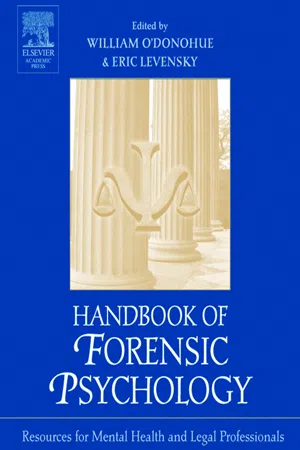
Handbook of Forensic Psychology
Resource for Mental Health and Legal Professionals
- 1,064 pages
- English
- PDF
- Available on iOS & Android
Handbook of Forensic Psychology
Resource for Mental Health and Legal Professionals
About This Book
Forensic psychology has mushroomed into a diverse and increasingly complex field that is equal parts law and psychology. Psychologists act as expert witnesses in legal cases - sometimes without knowing much about the laws involved, and legal professionals rely on the assessment of psychologists sometimes without knowing much about how such assessments are made. The purpose of this handbook is to provide professionals with current, practical, and empirically based information to guide their work in forensic settings, or to better their understanding of the issues and debates in forensic psychology.Divided into four sections, the Handbook of Forensic Psychology covers basic issues, assessment, mental disorders and forensic psychology, and special topics. The basic issue chapters present a primer on law for the psychologist, a primer on psychology for attorneys, an overview of ethical issues relevant to forensic psychology, and a chapter on forensic report writing. The assessment section discusses factors and measures relevant for assessing a variety of behaviors, propensities, and capabilities, including dangerousness, violence, suicide, competency, substance abuse, PTSD and neuropsychological evaluations, as well as discussing interviewing children and child custody evaluations. Additional chapters discuss eyewitness testimony, recovered memory, polygraphs, sexual harassment, juror selection, and issues of ethnicity in forensic psychology.
Frequently asked questions
Information
Table of contents
- Front Cover
- Handbook of Forensic Psychology
- Copyright Page
- Contents
- Contributors
- Preface
- Part I: Basic Issues
- Chapter 1. Psychology and the Law
- Chapter 2. An Introduction to Psychology for Attorneys
- Chapter 3. Ethical Issues in Forensic Psychology
- Chapter 4. Forensic Report writing
- Part II: Assessment
- Chapter 5. Assessment of Dangerousness and Criminal Responsibility
- Chapter 6. Issues in the Assessment, Communication, and Management of Risk for Violence
- Chapter 7. Forensic and Ethical Issues in the Assessment and Treatment of the Suicidal Patient
- Chapter 8. Assessing Intent and Criminal Responsibility
- Chapter 9. Assessing Adjudicative Competency: Using Legal and Empirical Principles to Inform Practice
- Chapter 10. Assessing Mental Competency in the Elderly
- Chapter 11. Child Custody Evaluations
- Chapter 12. Forensic Interviewing and Assessment Issues with Children
- Chapter 13. Evaluation of Psychological Damages
- Chapter 14. Detecting Malingering in Forensic Neuropsychological Evaluations in Litigants with Mild Traumatic Brain Injury
- Chapter 15. The Forensic Assessment of Substance Abuse
- Chapter 16. Assessment of Post-Traumatic Stress Disorder
- Part III: Mental Disorders and Forensic Psychology
- Chapter 17. Conduct Disorders and Impulse Control in Children
- Chapter 18. What Every Forensic Psychologist Should Know about Psychopathic Personality
- Chapter 19. Sexual Deviance and Forensic Psychology: A Primer
- Chapter 20. Disorders of Impulse Control
- Chapter 21. Developmental Disabilities and Mental Retardation
- Part IV: Special Topics
- Chapter 22. Issues in Eyewitness Testimony
- Chapter 23. In Search of Recovered Memories
- Chapter 24. A Daubert Testing of Hypnotically Refreshed Testimony in the Criminal Courts
- Chapter 25. A Critical Analysis of the Polygraph
- Chapter 26. Nonverbal Detection of Deception in Forensic Contexts
- Chapter 27. Forensic Issues in Sexual Harassment
- Chapter 28. Legal Issues in Child Abuse and Neglect
- Chapter 29. Partner Violence: Assessment, Prediction, and Intervention
- Chapter 30. Elder Abuse: Guidelines for Treatment
- Chapter 31. Involuntary Commitment
- Chapter 32. Jurors Can Be Selected: Noninformation, Misinformation, and Their Strategic Uses for Jury Selection
- Chapter 33. Issues of Ethnicity in Forensic Psychology: A Model for Hispanics in the United States
- Chapter 34. Psychology in a Secure Setting
- Chapter 35. Evaluation of Youth in the Juvenile Justice System
- Chapter 36. The Road to Perdition: Extreme Influence Tactics in the Interrogation Room
- Chapter 37. What's Good for the Goose Cooks the Gander: Inconsistencies between the Law and Psychology of Voluntary Intoxication and Sexual Assault
- Index